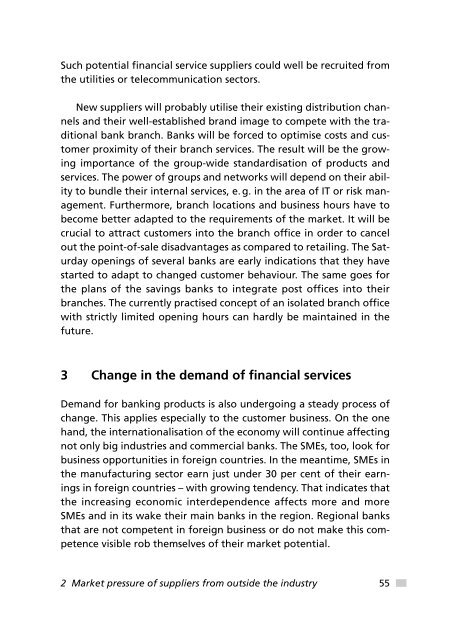Introduction - Genossenschaftsverband Bayern
Introduction - Genossenschaftsverband Bayern
Introduction - Genossenschaftsverband Bayern
You also want an ePaper? Increase the reach of your titles
YUMPU automatically turns print PDFs into web optimized ePapers that Google loves.
Such potential financial service suppliers could well be recruited from<br />
the utilities or telecommunication sectors.<br />
New suppliers will probably utilise their existing distribution channels<br />
and their well-established brand image to compete with the traditional<br />
bank branch. Banks will be forced to optimise costs and customer<br />
proximity of their branch services. The result will be the growing<br />
importance of the group-wide standardisation of products and<br />
services. The power of groups and networks will depend on their ability<br />
to bundle their internal services, e. g. in the area of IT or risk management.<br />
Furthermore, branch locations and business hours have to<br />
become better adapted to the requirements of the market. It will be<br />
crucial to attract customers into the branch office in order to cancel<br />
out the point-of-sale disadvantages as compared to retailing. The Saturday<br />
openings of several banks are early indications that they have<br />
started to adapt to changed customer behaviour. The same goes for<br />
the plans of the savings banks to integrate post offices into their<br />
branches. The currently practised concept of an isolated branch office<br />
with strictly limited opening hours can hardly be maintained in the<br />
future.<br />
3 Change in the demand of financial services<br />
Demand for banking products is also undergoing a steady process of<br />
change. This applies especially to the customer business. On the one<br />
hand, the internationalisation of the economy will continue affecting<br />
not only big industries and commercial banks. The SMEs, too, look for<br />
business opportunities in foreign countries. In the meantime, SMEs in<br />
the manufacturing sector earn just under 30 per cent of their earnings<br />
in foreign countries – with growing tendency. That indicates that<br />
the increasing economic interdependence affects more and more<br />
SMEs and in its wake their main banks in the region. Regional banks<br />
that are not competent in foreign business or do not make this competence<br />
visible rob themselves of their market potential.<br />
2 Market pressure of suppliers from outside the industry<br />
55
















